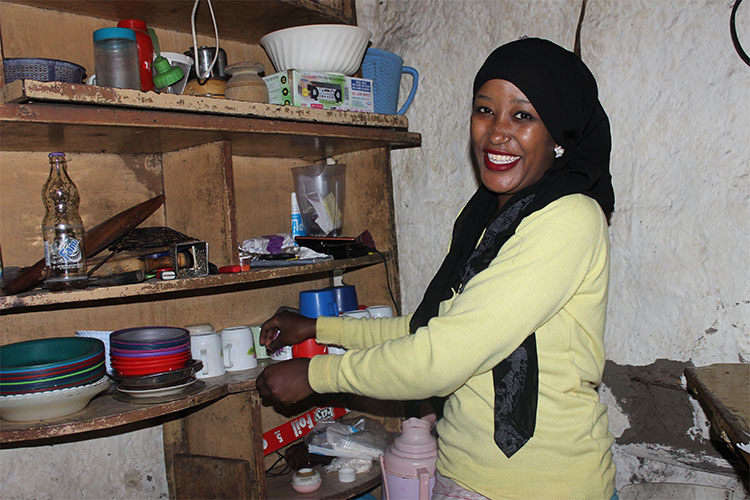
Photo Credit: Victor Gitonga/FHI 360
Tamimah grew up in Nakuru, a community in Kenya’s Rift Valley where the rate of HIV infection is high and where many young people don’t graduate high school. Tamimah’s early home life was precarious: Her mother left her and her three younger siblings, and her father provided limited support. The children were raised primarily by their grandmother.
Before Tamimah turned 13, her grandmother died, leaving the children without primary support. Tamimah and her two sisters and brother struggled to take care of themselves, stay in school and be healthy. It was “very hard to grow up in this place,” Tamimah said.
Things began to shift, however, when they were recruited to take part in APHIAplus, an FHI 360 project focused on improving health care delivery and multisector services to vulnerable populations in the Rift Valley. Through APHIAplus, which is funded by the U.S. Agency for International Development, Tamimah gained access to health education and services. She also received support to cover the costs of her school fees and supplies.
From these multipronged activities, there was a ripple effect: She was able to stay in school. Upon graduation, Tamimah studied tailoring through a vocational program also offered through APHIAplus and was able to provide for her siblings. After a year, she saved enough to open Al Hamis Café, named after her brother.
Tamimah’s story is not unique, but it’s illustrative of the complex, interconnected challenges faced by many people in the developing world. Projects such as APHIAplus embrace the complexity of people’s lives by using integrated, multisector approaches to help them successfully navigate obstacles to a better life. APHIAplus is one of more than 70 integrated development programs in which FHI 360 has been involved.
Receiving health care alone would have offered only one solution to a problem that has many roots. Click To TweetFor Tamimah and other participants in APHIAplus, receiving health care, educational support or livelihood training alone would have offered only one solution to a problem that has many roots. In the era of the Sustainable Development Goals (SDGs), it’s imperative that implementing and funding organizations consider the power of integrated approaches to make a deeper, more sustainable impact on people’s lives. Although there are challenges to carrying out integrated projects, community participants in APHIAplus did not feel that the project was too complicated; it responded to their needs.
As part of FHI 360’s commitment to better understand the potential of integrated development, we have been working systematically to collect and synthesize information from our integrated efforts to identify common themes, challenges, lessons learned, best practices and tools. Drawing from our experience, FHI 360 is developing guidance and tools for global development practitioners and funders interested in delivering integrated approaches.
Among the key considerations we recommend are for both funders and practitioners to allow sufficient time for robust formative and needs assessments, and to better leverage national, regional and global laws and policies that support integration. It’s also critical to establish creative mechanisms for staff in distinct sectors to routinely interact, exchange lessons and ideas, and collectively problem solve and plan.
Developing intentionally integrated projects with the help of evidence-based guidance tools can help provide a meaningful path for people like Tamimah. This young entrepreneur already has her eye on her next endeavor: She’s saving to move her business to a more central location, where she anticipates greater profits.
Tamimah has not forgotten the roadblocks she had to overcome, and she credits APHIAplus with helping to change her life. These days, she is hopeful and confident. She told me she now has the tools to provide for herself and her family for the rest of her life and to serve as an example to people in her community. “I try to influence others,” Tamimah said. “I am a role model.”
Join FHI 360 on June 13, 2016, for a summit on integrated development. Learn more and register today!
